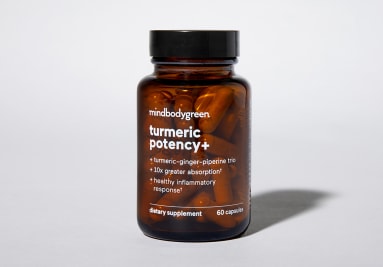Why Turmeric & Ginger Are Such An Effective Ingredient Combination

Peanut butter and jelly, avocado and toast, tomato and mozzarella—some things were just made to go together. When thinking about turmeric's ideal pairing, most people's minds go to black pepper. And while the piperine in black pepper does slightly enhance the absorbability of the root, we'd argue there's another botanical buddy that deserves a spot next to turmeric: ginger.
Health benefits of turmeric and ginger
Turmeric and ginger actually come from the same plant family native to Southeast Asia, Zingiberaceae1. You can think of the roots as close cousins of each other, and they share a number of complementary traits.
For example, both ginger and turmeric combat oxidative stress.* Research finds the plants work synergistically to keep our endocrine systems in check and promote healthy inflammatory responses2.* Like turmeric, ginger has also been shown to promote joint health and support muscle fitness3.*
"They act in similar ways in the body through key antioxidant and immunomodulatory actions to support a healthy inflammatory response,"* Ashley Jordan Ferira, Ph.D., RDN, the vice president of scientific affairs at mindbodygreen, says of the duo.
"While turmeric and ginger have their similarities, they also work via unique biological pathways, too, giving these powerful spices synergy and individual benefits," Ferira adds. Ginger, for example, has unique gastroprotective properties thanks to its ability to encourage more efficient digestion.* Extracts of the plant have also been shown to support healthy cognitive function4.*
Summary
How to use turmeric and ginger
With such a suite of complementary actions, it's no wonder the two plants have been linked together in Ayurvedic cooking for centuries (ginger turmeric tea is a staple in the ancient medical system). However, the amount of turmeric and ginger you'd use to flavor a meal is minimal compared to the dose you'd need to reap the duo's full benefits. Luckily, you can also find the plant pair synched up in one of mindbodygreen's newest supplements, turmeric potency+, which combines 500 mg of turmeric root extract with 150 mg of ginger root and 5 mg of black pepper fruit (famous for its piperine).
Plant synergy at its finest, the supplement utilizes full-spectrum ginger and turmeric to deliver the complete array of bioactives that make these buddies so powerful.
It offers a convenient way to reap the benefits of these antioxidant-rich ingredients daily, in clinically relevant doses for supporting your joints and muscles, digestion, mood, inflammatory response, and overall health.* The targeted supplement is great for anyone who wants to nurture their body's resilience daily using plant-forward nutrition.* "Turmeric, ginger, and black pepper are powerful antioxidant besties you want on your spice team... To benefit from this plant-powered trio in their most absorbable and potent forms, a convenient option is mindbodygreen's turmeric potency+. Just two vegan capsules a day and you're golden,"* says dietitian and mindful eating expert Jennifer Hnat, R.D.N.
The takeaway
Black pepper always gets to cozy up with turmeric, while ginger is a functional food that doesn't always get its fair share of attention. By pairing ginger and turmeric—both members of the Zingiberaceae family—in foods and supplements, you'll reap the complementary benefits of these powerful plants.

Emma Loewe is the Sustainability and Health Director at mindbodygreen and the author of Return to Nature: The New Science of How Natural Landscapes Restore Us. She is also the co-author of The Spirit Almanac: A Modern Guide To Ancient Self Care, which she wrote alongside Lindsay Kellner.
Emma received her B.A. in Environmental Science & Policy with a specialty in environmental communications from Duke University. In addition to penning over 1,000 mbg articles on topics from the water crisis in California to the rise of urban beekeeping, her work has appeared on Grist, Bloomberg News, Bustle, and Forbes. She's spoken about the intersection of self-care and sustainability on podcasts and live events alongside environmental thought leaders like Marci Zaroff, Gay Browne, and Summer Rayne Oakes.

